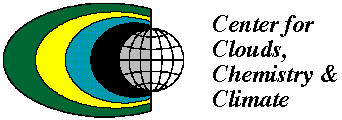To disseminate new knowledge and technology in the broadest ways possible, and to assist the national laboratories, hence the nation, in maintaining the lead in global climate change and environmental research.
The Center for Clouds, Chemistry and Climate offers the following comprehensive education and outreach programs for professional scientists, graduate students, undergraduates, K-12 teachers, agencies, industries and research institutions.
Progress to date (1994-1997)
Education and Training
Graduate and Advanced Level
Several C4 courses and workshops enhanced the interaction between graduate students,
post-doctoral fellows and advanced researchers.
Summer Course in Climate Modeling
In 1995 and 1996, C4 organized a two week summer course on coupled atmosphere-ocean
modeling directed by J.T. Kiehl, of the Climate Modeling Section at NCAR. Instructors
included J. McWilliams of UCLA, and W.D. Collins and G. Zhang from SIO/UCSD.
These lectures presented talks on observations of atmospheric and oceanic circulation,
parameterization of physical and dynamical coupling processes, and current or related
topics in coupled atmosphere-ocean research. The participants, 15 graduate students and
faculty from undergraduate colleges across the country, participated in lively discussions
after each lecture, and commented through evaluations that the course was quite successful
in describing complex issues associated with the coupled atmosphere-ocean system.
Advance Workshops to Present CEPEX Results to the Scientific
Community
Several workshops were held to distribute information on CEPEX, including:


 C4Home Page
C4Home Page